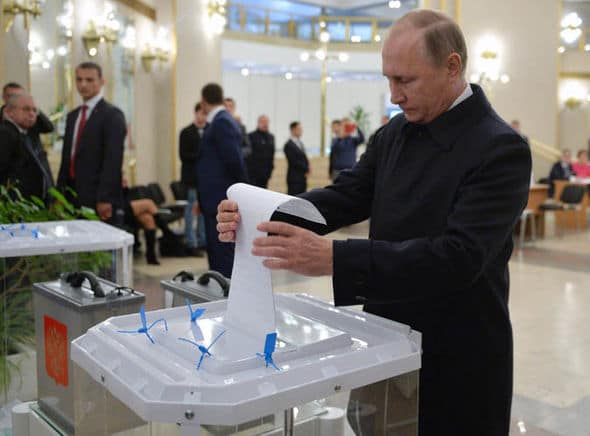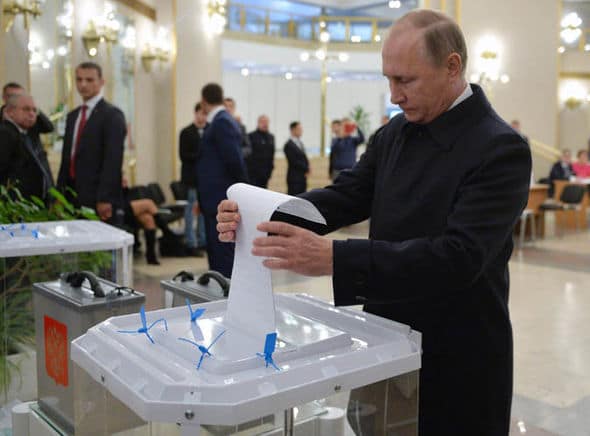
Once you let the genie out of the bottle, you can’t stuff him back in.
Attempts to overturn the results of our election, or to delegitimize a president before he even takes office, are attempts to overturn the system of transfer of power that has served America since its earliest days. There is no measure of exaggeration here; Americans are questioning the results of the election because roughly half don’t like the guy who won.
Somehow thing are… special this year. In most elections, a good-sized group of us see our candidate lose, grumble, and move on to some degree. I don’t think Trump will be a good president, but I also do not think he will burn civil rights to the ground, destroy life on the planet, sell Alaska back to Russia, or invade China with Omarosa some drunk weekend.
In what in another era would be left for conspiracy theorists to contemplate, for the first time in our nation’s history powerful mainstream forces are trying to change the results of an election. Shocked by Trump’s victory, and fearing his presidency, they want to stop him from entering the White House. The belief seems to be that he is such a threat that it is necessary to destroy a part of democracy in America to save it.
Some efforts are silly, online petitions demanding, somehow, Clinton become president (here’s one asking the Supreme Court to invalidate the election,) or bleating that her popular vote victory matters somehow within the existing electoral process. Others call for a magic do-over, a new election.
Political scientists claim they maybe have found untested ways for the Electoral College to vote for Clinton, or to postpone a vote.
But after that it gets very serious. America’s foreign intelligence service, the CIA, via anonymous leaks to the New York Times, NBC, and the Washington Post, declared Russia actively and purposefully interceded in our election in favor of Donald Trump. Trump was elected, in part, by the work of Russian cyber blackops.
It is important to unpack what the accusations driving this are: someone working for the Russian government broke into the Democratic National Committee servers and Clinton campaign head John Podesta’s Gmail account, delivered those emails (which the Clinton campaign by and large said were bogus or altered) to places like Wikileaks, and that the emails few voters read influenced the election such that Trump, not Clinton, won the electoral vote. Trump’s strengths as a candidate and Clinton weaknesses were not significant enough on their own to have swayed the electoral count 74 votes in Trump’s favor. At the same time, for these accusations to matter, President Trump will act in favor of Russian interests (choosing hard liner John Bolton as number two at the State Department already seems counter to that) and against those of the United States.
The accusations against Trump can rise to the level of treason (some are speculating Trump was a willing participant in any Russian ops), a capital crime, the most serious crime an American can commit against his country.
All is supposed to be revealed in the form of some sort of investigation.
Leaving how clever use of redactions can present “evidence” in misleading ways, intelligence assessments are rarely black and white, especially when seeking to explain why an action took place, its ultimate political goal. An intelligence service can conclude with reasonable confidence (for example) that Country X executed 12 dissidents last week. It is much harder to say why, or why now, or why those 12, or why not a different group, or what those executions mean in the longer game of local politics. So while technical means may be able to point to a hacker with connections to Russia (though hackers include in their tradecraft leaving false clues), moving from whether any hacks were standard information gathering as engaged in by all sides, or an active part of a campaign to change the course of our election, is a tough job. So those who expect a black and white report on what they Russians did, why they did it, and how it affected the election, are very unlikely to get it.
So what will be done?
The current focus is on the Electoral College voting on Monday, December 19 to put Hillary Clinton into the White House. That would require breaking with some 224 years of practice, moving against the will of about half of American voters who acted in good faith under the current system believing their vote would be assessed by the rules and practices in place, and destroying the orderly transfer of power that marks a democracy.
But if Trump prevails in the Electoral College, what next? There is no Constitutional allowance for a “second election.” Bomb Moscow? Keep Barack Obama in power? Dispatch a lynch mob to Trump Tower?
Well, of course not. Probably.
Instead we will enter a new administration with a delegitimized president, under the shadow of multiple conspiracy theories, accusations, hearings, investigations and likely threats to of impeachment proceedings. Every decision President Trump makes, as with his every Cabinet choice now, will be weighed against the accusations. America’s Russia policy (in Europe, the Middle East, Asia) will be held hostage to rumors and leaks. A divided America will become more divided.
The Bush-Gore election of 2000 was contested right into the Supreme Court. The differences, however, are significant. The post-election fight took place between two men still candidates, to decide a winner. Trump is the President Elect, and the process, whatever it is, seeks to overturn, not decide, that result. In Bush-Gore, once the Court declared a winner, the results were accepted, albeit reluctantly by some, and America moved on. Lastly, the struggle between Bush and Gore took place in open court, not via leaks and classified documents.
There is also the argument, basically a variation of “if you have nothing to hide you have nothing to fear” that Americans should be willing to submit to post-election recounts and investigations, themselves often inconclusive or subject to another round of questions, to “prove” nothing went amiss. There is danger in confusing a potential body blow to the electoral process, seeking to overturn a completed election, with casting it all as benign verification.
An additional danger is in the McCarthy-esque conflating of opposition to these efforts with a lack of patriotism, and by invalid extension, support for America’s enemies. To remain skeptical is to stand against the United States. To question the CIA is to disrespect our intelligence professionals. Journalists who do not support the accusations are said to be either active Russian agents of influence or “useful idiots” too dumb to know they are being manipulated.
The real impact of all this will be felt long past Trump’s tenure.
Democrats, Republicans, and players such as the CIA will have four years to consider how this process of delegitimizing a President Elect could work more effectively next time. The people who support extra-Constitutional steps now because of Donald Trump will find those same step will be available in later elections, to use against a candidate they favor. Voting can potentially become only a preliminary gesture, with real struggle only starting after the election itself.
Many are deeply upset Hillary Clinton lost. Many are unsure, even fearful, of a Trump presidency. But once you let the genie of trying to overturn an election loose, you won’t be able to stop it next time.
Reprinted with permission from WeMeantWell.com.


